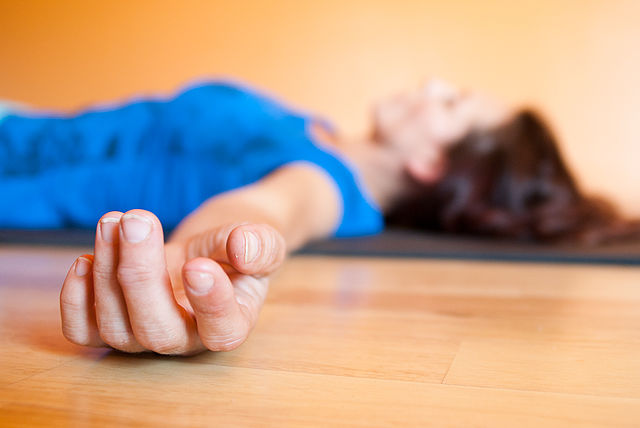I got into a fight with yoga over savasana, and we almost broke up.
I’m told that savasana (or final resting pose) is the hardest yoga pose to practice—that being present in the stillness of the moment is the true test of the practice.
I get it now. Savasana is not nap time. While an opportunity to rest, it’s a pose to celebrate self-love and self-acceptance.
Savasana had recently felt scary, long, intense, and busy—and I didn’t know why.
So, I turned to wikiHow to find post-yoga breakup help, because my therapist wasn’t accessible at 4:30 p.m. on a Saturday, and she probably would’ve discouraged this breakup anyway.
I learned from wikiHow—as well as numerous self-help blog posts—that I already practice many of the ways for us to foster self-love, compassion, and acceptance.
These practices for me include, but are not limited to: doing loving-kindness meditation, practicing yoga, seeing a therapist and a nutritionist, sleeping well, leaving work on time, leaving work at work, making my social media feeds positive, journaling, reciting positive affirmations to myself daily, saying no and meaning it, seeking respite through music and travel, employing boundaries, and simply resting.
Then it dawned on me.
I do a lot of self-care.
I do a lot.
Then I realized that I feel exhausted. I’m exhausted from doing self-care, and, in turn, am exhausted from trying to love myself.
I’m exerting a lot of energy on self-care activities, so much energy that my self-care practices aren’t regenerative like they used to be.
Perhaps I over-engage in self-care practices to force myself into caring for myself, to keep my self-loathing at bay. Perhaps I’m creating diversions and distractions for myself so that I can avoid my uncomfortable feelings of shame and guilt.
Maybe I’m rushing and still distrustful of the process. If there’s nothing wrong with my self-care activities, then maybe my exhaustion is rooted in the emotional toll the process of transformation is taking.
Perhaps it’s not that deep. Perhaps I’m simply tired because adulting is hard and tiring.
While I have a lot to learn about this, I did resolve that I don’t want to stop engaging in my self-care practices, which I think are objectively healthy and appropriate.
I would never encourage a client to stop caring for himself or herself—from preventing self-love, health, and growth as a response to feeling tired from healing. I would, rather, explore with the client why he or she is feeling tired from healing.
Through self-reflection, I learned we can’t love ourselves too much, but we can do too much and try too hard.
I learned I’m striving to self-care to become better—quickly and desperately. I’m striving to love a version of myself that I haven’t become, instead of loving myself exactly as I am in this moment.
There’s no break to self-love. But the fact that I feel as though I need one tells me something.
Self-love is hard because I haven’t accepted myself yet as the beautiful work in progress that I am.
I wasn’t fully prepared for my journey of healing. How could anyone be?
I’ve done the work necessary to accept that I had a pattern of behavior that was maladaptive—a pattern that, albeit protective, disconnected me from others and caused me harm in many ways.
I’ve done the work necessary to understand this behavior compassionately as a response to my past, a pattern that is a symptom of trauma.
Without realizing it, I’ve now allowed myself to internalize that understanding as a reason to discard, disregard, and dismiss the “old Genevieve,” trying to evict her from the attic of my heart through excessive self-care.
I’ve removed my maladaptive and objectively unhealthy coping mechanisms and replaced them with an exhaustive buffet of healthy coping strategies, which I’m now abusing.
Anyone who knows me well enough knows that I’m a woman who loves to rush around and be immersed in activity. Constantly impatient, I’m always on the go, desperate to achieve the next milestone. I’ve allowed my strengths of being organized and ambitious to turn into prescriptive and rigid five-year plans.
I’ve fallen into the very trap set out for new yogis. I got far too caught up doing yoga instead of being mindful of myself as I am in a yoga practice.
Savasana is threatening because I’m still uncomfortable with myself, still unaccepting of who I was, still dissatisfied with who I am, and still impatient to achieve my best self.
I forgot along the way that I already am my best self—right here, right now.
We all are.
After all, the relationships we have with ourselves are the longest relationships we’ll ever have, and so they should be the healthiest and most loving relationships possible.
I guess this means that I’ll take myself on a date in savasana.
Namaste.
~
Author: Genevieve Gellert-Ilg
Image: Wikimedia Commons
Editor: Leah Sugerman









Read 7 comments and reply